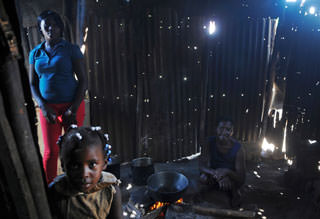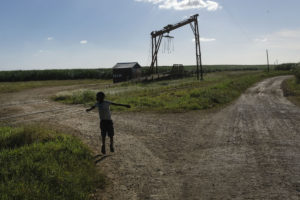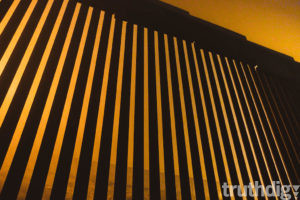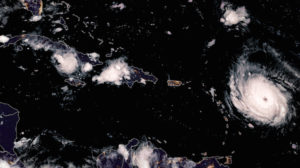Dominican Republic Makes Racism the Law
The country has proclaimed that any Dominicans who descend from undocumented Haitians going back as far as 1929 are to be stripped of their citizenship.
The ogre is loose on the island again. The highest court in the Dominican Republic, the Constitutional Tribunal, has taken a huge step backward with Ruling 0168-13. The Sept. 23 decision proclaimed that any Dominicans who descend from undocumented Haitians going back as far as 1929 are to be stripped of their citizenship. This affects an estimated 250,000 Dominicans of Haitian descent but mostly without any connection to Haiti — Spanish speaking Dominicans with no other country. What does it mean that 2.5 percent of the Dominican population (the same percentage in the U.S. would be more people than live in Arizona or Indiana) has just lost most of its legal rights because of race? Why have the old Dominican specters of racism and political instability, disturbing prospects in a country with a history of civil war, risen up at what had seemed a quiet moment for the troubled country?
Race has been the great political divide in the Dominican Republic since its founding. In 1822, the Haitian army that had defeated Napoleon in the world’s first successful slave rebellion and declared the first independent modern black state marched across the island to the Spanish colony on the other side, took it over and immediately abolished slavery. The Haitians believed that only a nation with a large black population could be depended on to never bring back the hated practice of slavery. They began gathering free blacks, often liberated slaves, from the U.S. to make the population “blacker.”
Feb. 27, Dominican independence day, does not celebrate independence from Spain but rather from Haiti in 1844. On Feb. 27, 1844, a nation named the Dominican Republic that banned slavery and welcomed a diverse population was founded, but the people have been arguing about the diverse population ever since.
According to official tallies, the Dominican population is 73 percent mixed, 16 percent white and 11 percent black. So for those who want to worry about such things, population shifts could make Dominicans whiter or blacker. It has become part of not only the politics but the folklore of the country. Uneducated peasants sometimes believe that a pregnant woman can assure a whiter baby by eating white colored food. Milk of magnesia or milk itself is sometimes recommended.
A racist sector of the Dominican political class has clung not only to Western attitudes of black inferiority but to white Western countries themselves. At various times in Dominican history there have been attempts to annex the country back to Spain, to France, to the United States and to Símón Bolívar’s Gran Colombia — almost anything to assure that it would not join up with the black people on the other side of their island.
Most of the Haitians who came to the Dominican Republic, including the parents of most of the Dominicans who now find themselves declared stateless, were brought in by unscrupulous elite Dominicans who defied the country’s laws to procure cheap labor for the often American owned sugar companies. If slavery was not to be allowed this was the closest thing to it. They were kept in barracks lacking basic amenities and deprived of all civil rights.
In 1912, in an effort to prevent what it saw as a “blackening of the population,” the government decreed highly restrictive measures to limit the number of black people allowed to enter the country. The sugar companies just ignored the restrictions and brought in Haitian workers; the government did not try to stop them because Cuba, the Dominican Republic and Puerto Rico were in the midst of a sugar boom popularly known as “the dance of the millions.”
Under the American trained and supported tyrant Rafael Trujillo, who ruled for 31 years, an estimated 20,000 Haitians were massacred in five days in October 1937. Trujillo said that he was “cleansing” the border region.
The racism has continued. In 1983 the then-president of the Dominican Republic, Joaquin Balaguer, published a book “La Isla al Revés” (The Island in Reverse) claiming that the Haitians were still trying to invade but now their secret weapon was “biological.” According to Balaguer, Haitians “multiply with a rapidity that is almost comparable to that of a vegetable species.”
In 1996 when José Francisco Peña Gómez — a popular Dominican politician with black skin and African features — ran for president, Balaguer insisted that he was an undercover Haitian with a secret plan to turn the Dominican Republic back over to Haiti. Peña Gómez, a Dominican with Dominican born parents and one Haitian grandparent, was frequently said to be Haitian. Under the new ruling in which this bigotry has the sanction of law, were he still alive he could lose his Dominican citizenship.What is to become of a quarter of a million stateless Dominicans? The government is not clear on its intentions but one of the important lessons of the Nazi Holocaust is that the first step to genocide is to strip people of their right to citizenship. They are legally helpless.
The ruling will make it difficult for these Dominicans to register for school; to work in the formal sector of the economy; to pay insurance; to pay into pension funds; to get married legally; to register children; to open bank accounts; to make purchases; to receive inheritances; and even to leave the country that now rejects them because they cannot obtain or renew their passport.
There are already reports from Puerto Rico of small boats attempting to cross the wild white-capped dangerous sea of the Mona Passage where the Atlantic rushes into the strait between the two islands.
But this is not such a grave crisis, the Dominican government keeps insisting, because the Haitian constitution guarantees citizenship to anyone with Haitian parents. Aside from the fact that this claim is neither as certain nor as automatic as the Dominican government suggests, it would be like saying that American Jews can be stripped of their citizenship because, after all, they have the right to Israeli citizenship.
But why would the Dominican government be doing this? It has been suggested that as elections get tighter each round, this would be a way for the ruling Dominican Liberation Party and President Danilo Medina to disenfranchise black voters who seldom support them. Or it could be an attempt to whip up waning enthusiasm among their base.
But it could also be a political mistake because it appears to have mobilized the opposition. One group, the Solidarity Committee, has collected letters from 500 prominent citizens including jurists, artists, journalists, writers, community activists and civic leaders protesting the court ruling. The two out of 13 judges on the high court who opposed the decision have been outspoken. Eddie Olivares, a member of the Central Electoral Board that has been charged with counting the “illegal” Dominicans, has questioned the legality of the order.
There always have been a large number of Dominicans who opposed racist policies, possibly even a majority. In 1996 more people voted for Peña Gómez than Balaguer.
According to the U.S. Census, 1.5 million people living in the United States consider themselves Dominican. Slightly less than half of them have U.S. citizenship yet nearly all of them, even those born in the U.S., have the right to Dominican citizenship and they find it odd and unjust that some of their fellow countrymen born and living in the Dominican Republic are losing theirs. Silvio Torres-Saillant, a Dominican-American professor at Syracuse University, said of the ruling, “It redefines Dominican nationality in a way that makes Dominicanness a shameful thing.”
The fear is that this ruling is only the beginning. Poet Rhina Espaillat, whose family fled the Trujillo regime in 1939 when she was a young girl, said, “Witnessing, for several weeks now, the progress and aftermath of the Dominican Constitutional Court’s Sentence 0168-13, and the bitter divisions to which it has given rise in my native country, as well as the condemnations it has rightly earned from the international community, I have what I can only describe as that 1939 feeling.”
A number of international organizations including the 15-nation pan Caribbean Community and the United Nations have already denounced the ruling, with the U.N. claiming it was in violation of its Declaration of Human Rights. Opponents want a decision from the Inter-American Court of Human Rights.
If the issue moves to international venues, if the Dominican political situation becomes tenser, if a huge refugee crisis is created, it is going to become difficult for the United States not to get involved.
If this Caribbean nation less than 800 miles from our shore has an odd and troubled history, it is one with which the United States is intertwined. The U.S. government once considered annexing the Dominican Republic but the Senate rejected the proposal. The U.S. military has twice invaded and occupied the country. We have deposed elected presidents, installed dictators and had them killed — in the case of Trujillo, both.
And the U.S. is already involved as a key player in the Dominican economy, originally because of sugar and today because of tourism. The 4 million people who visit the country annually are a mainstay of its economy; more than half are American. The Dominicans have built resorts along their coastline and constructed nearby airports so that tourists can fly in, spend a week and fly out without seeing or even considering the Dominican Republic. Perhaps this citizenship ruling will make them start thinking about it.
Your support matters…Independent journalism is under threat and overshadowed by heavily funded mainstream media.
You can help level the playing field. Become a member.
Your tax-deductible contribution keeps us digging beneath the headlines to give you thought-provoking, investigative reporting and analysis that unearths what's really happening- without compromise.
Give today to support our courageous, independent journalists.






You need to be a supporter to comment.
There are currently no responses to this article.
Be the first to respond.